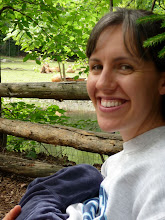I am truly not sure how I feel after finishing Robert McCloskey's Homer Price (Puffin Books, 2005). I did enjoy the book very much, but when I recall the sunny hours I spent reading about friendly pet skunks and runaway doughnut-baking machines, there's a shadow around the edges. I'm not even sure I can define it, but I'll try.
First, a word about the book. Homer Price is not quite a novel, nor is it a collection of short stories, but something in between. The best comparison I can think of is to a sitcom: a short-running one with only six episodes. Each episode (neither "chapter" nor "story" seems right) is a discrete narrative, but you kind of need to have read the preceding ones in order to be fully in the loop and comfortable with the landscape.
Homer Price is a young boy who lives in the small American town of Centerburg in the 1940s. (The first edition of the book came out in 1943). The volume opens with an account of how Homer and his pet skunk Aroma help capture a small band of thieves who have stolen $2000 and some bottles of aftershave. It progresses through a number of vignettes that are usually humorous or at least cheery--one involves a contest among three Centerburg residents to see who has the largest ball of string--but by the end, things have gotten just a tad creepy.
The penultimate tale, about a Rip Van Winkle-esque stranger who has invented a giant musical mousetrap with which he proposes to de-mouse Centerburg, starts with a chuckle but ends with a shudder as the mayor essentially has to pay a ransom to keep the stranger from leading away all the children Pied-Piper fashion. By the end of the book, it seems that Centerburg as we have known it is done for. A new suburb has been built with one hundred perfectly identical houses, "down to the last doorknob." The episode itself is funny enough: There is a problem with the Street-Sign-Putter-Uppers' Union, which delays the erection of the street signs in the new suburb, so the residents have a bit of a tricky time finding their way home among all of those identical houses. On the other hand, it seems sad that this comical little town has suddenly exploded in size, and not even in a creative or interesting way. One grieves over the mass production of these depressingly unoriginal and indistinctive houses.
Still, it's nice to read a book about a boy who says "Gosh," reads ten-cent comic books, and accidentally fills his uncle's lunch room with thousands of fresh homemade doughnuts (though there are racist elements that, sadly, infect the book). Oh, and the uncle's name? Ulysses. His wife's name isn't Penelope, but there is another uncle named Telemachus. If I figure out the deep meaning that somehow connects little Centerburg to glorious Ithaca, I'll get back to you, but I sort of hope I don't. For now, I'm just enjoying the fact that in the final episode, we find out that the original name of Centerburg was Edible Fungus. In spite of the eerie feeling that new suburb had given me by then, I appreciated the good laugh I got out of that one.

No comments:
Post a Comment